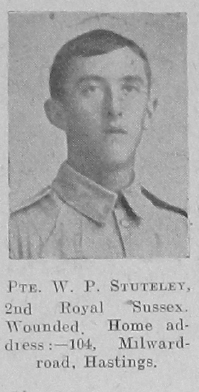 Army
Army
Stuteley, William P
 William P Stuteley
William P Stuteley
Rank: Private
Regiment: 2nd Battalion, Royal Sussex Regiment
Address: 104 Milward Road, Hastings
Other Info: Wounded.
An article published in the Hastings & St Leonards Observer reads: “Private W. P. Stuteley, 2nd Battalion, Royal Sussex Regiment, is now at his home at 104 Milward Road, Hastings, recovering from a rifle shot in his right ankle, which severed a tendon, and may cause him to be permanently lame.
He is a nephew of the late Mr. Edward Stuteley, formerly bandmaster of the Hastings Town Band for a number of years and son of Mr & Mrs William Stuteley, now residing in Hastings. He served eleven years and seven months in the Regiment and then went on the Reserve, being called up for service with the Expeditionary Force.
Private Stuteley went through the Battles of Mons, the Marne, the Aisne, La Bassee and Ypres, receiving his injury on the second day of the latter battle. This was on October 30th, so that he had been fighting continuously from October 10th, escaping harm often in a miraculous manner, as some of the engagements were decidedly ‘hot’. When he was hit he was lying flat on his stomach, shooting at the Germans who were within 50 yards.
The shock was so great that he was turned right over on his back. He felt no pain for some time, but he found he was unable to walk, so had perforce to crawl two miles before he could find the first aid hospital.
The men he was then fighting with had a position about seven miles outside of Ypres, where he had to wait a day and a night in the station for a hospital train to take him to Boulogne, from whence he was sent on the Carisbrooke Castle to Southampton, and thence to Aldershot, where, after remaining nine days, he was allowed home on sick leave.
He speaks in the highest possible terms of the general management of the War on the English side so far as the comfort of the men is concerned. The food transport he regards as little short of marvellous. The supply is steady and ample, and when it comes to hot soup being served in the trenches there is need to say little more.
The work, nevertheless, from the soldiers’ standpoint is terribly hard, and there is very great privation to be suffered. It is not war in the ordinary sense. It is scientific slaughter.
He hopes that the War may be nearly over in January, and that the Germans will be then be well beaten. Large numbers of prisoners come in every day, men of 50 and boys of 15 together, and all say they have had enough.
Published: November 1914
Please use the comments box below if you can provide more information about this person.